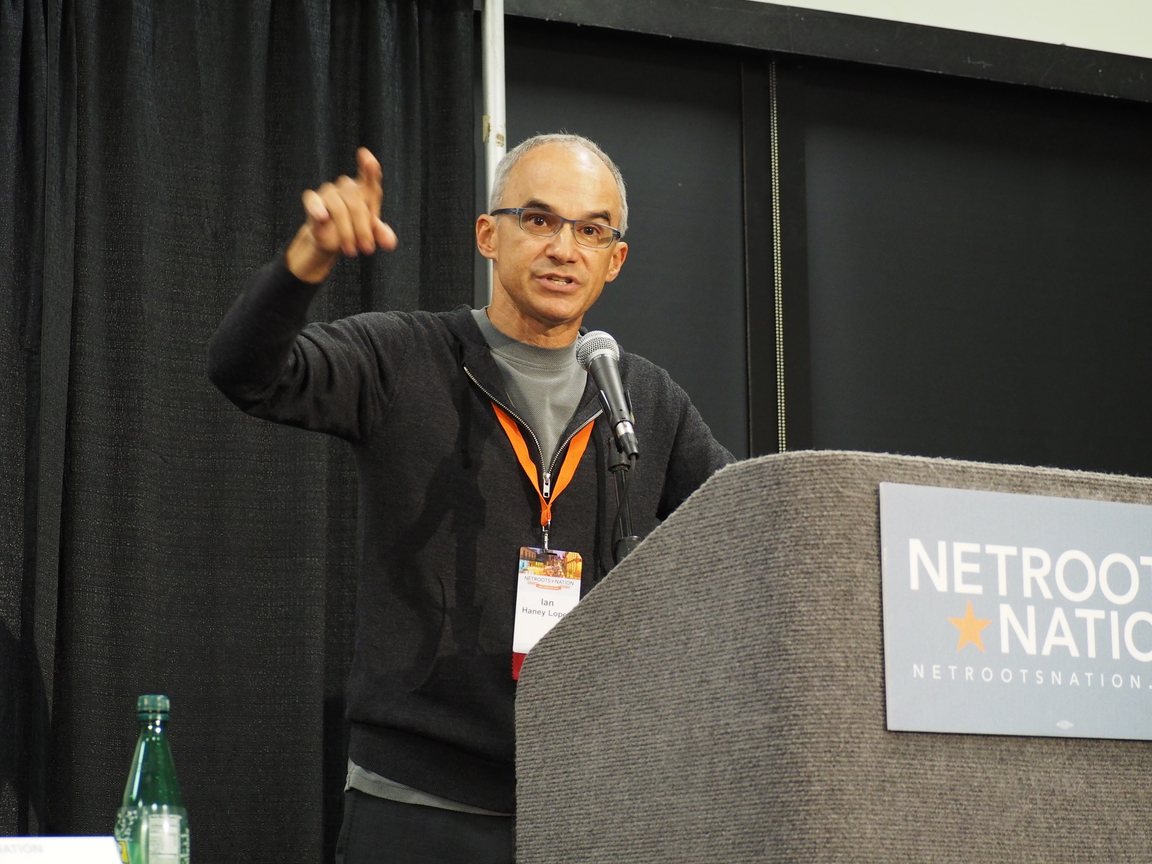Hello again from New Orleans!
There was an excellent presentation this morning on the effectiveness of using messaging that explicitly addresses race. Race-Class: How to Build a Truly Multiracial Movement for Racial Justice and Shared Prosperity for All featured Ian Honey Lopez, author of Dog Whistle Politics, Causten Rodriguez-Wollerman of Demos Action, and Celinda Lake of Lake Research Partners.
Before they started their discussion, a video message from Heather McFee, a Distinguished Senior Fellow of Demos Action was shown.
McGee (who couldn’t make it to Netroots Nation) explained that we wouldn’t have the poverty wage economy we have today if it weren’t for racism being used as a force to create a hierarchy of human value. We have distortion in our democracy for the same reason, along with the fear of political power for people of color.
They created their project to tell the truth: that the current economic populist message is accurate, but incomplete, because it is not being honest about how racism is part of the issue. So they developed a set of stories and tested the messages head-to-head.
“If we don’t get this right,” she said, “integrate our story and our movement, not only will we not win, but we won’t fulfill the promise of this country.” It is up to progressives to get it done, to create opportunity and justice for everyone, she said. “It is up to us to call out racism and invite people of all races into coalition that is necessary to make the America we believe in possible.”
Lopez started the live discussion by pointing out that race has been used as a weapon in politics for decades, and Trump is no different.
He says that Trump’s message of dog whistling, especially around immigration, is the Republican frame for 2018, because its very powerful with their base, and because they cannot attract biconceptual voters without it.
So-called colorblind economic populism is not the way to respond. It elevates economics and ignores racial issues, under the theory that race divides us and that we should focus on what unites us, and the thing we all have in common is economics. But race does divide us! To not acknowledge this does not make it go away and the messaging is not as effective as when we tell the truth about race.
They tested audio messages of conservative messages, colorblind economic populist messages, and economic populist messages that specifically name race and call people to work together across racial lines to address the economic issue. All six race/class messages performed better than colorblind economic populism.
They also found that calling out divisive tactics with explicit references to race beats opposition race baiting messages on immigration, and resonates more strongly than an identical message that doesn’t name race. However, calling out division does not stand up to dog whistling if it fails to include a call for unity.
The study results showed that after hearing race-class messages, respondents move towards greater support for progressive policies.
“So whatever issue you care about, you need to figure out how to address racist dog whistling in government,” said Lopez.
He next broke down the anatomy of a winning narrative. Race should be discussed overtly and as including everyone, whites too.
We must explain division as a “divide and distract” strategy behind economic inequality and racial injustice. Then we’ve got to emphasize unity and collective action to solve problems. Finally, we must invoke previous cross-racial solidarity victories to combat cynicism, and connect working together to government for all.
Rodriguez-Wollerman spoke next and said that just simply naming race in these messages doesn’t seem like it’s doing much to really call out racism. The reality is that in our political discourse on the left, the floor for talking about race is very low, so even when we just mention it a little, to some it feels like we are yelling.
When we don’t directly address race and dog whistle messages, he said, people know that we aren’t being honest.
But when we call it out and address it, we build trust and authenticity. Invoking cross-racial solidarity helps to get past people’s cynicism.
Lake runs the company that did the research and polling.
She pointed out that even if we try to avoid talking about race, people’s feelings about race will still be there. She also said that biconceptual voters are not confused, but rather have the ability to reason using either a right wing frame or a progressive frame, so we need to consistently reframe to ensure the logic of progressive values is actively guiding the thinking and behavior of more people.
More information on race-class messaging and the project’s findings are available from the Demos Action website.

